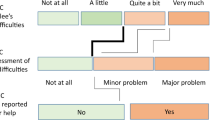Abstract
The present study set out to evaluate perceptions of risk, psychological morbidity and health behaviours in women with a family history of breast cancer who have attended genetic counselling and determine how these differ from general population risk women. Data were collected from 62 genetic counselees (cases) attending the Royal Marsden and Mayday University Hospital genetic counselling services and 62 matched GP attenders (controls). Levels of general psychological morbidity were found to be similar between cases and controls; however, cases reported significantly higher breast cancer-specific distress despite clinic attendance [mean (s.d.) total Impact of Event Scale score, 14.1 (14.3) cases; 2.4 (6.7) controls, P < 0.001]. Although cases perceived themselves to be more susceptible to breast cancer, many women failed correctly to recall risk figures provided by the clinic; 66% could not accurately recall their own lifetime chance. Clinics appeared to have a positive impact on preventive behaviours and cases tended to engage more regularly in breast self-examination (monthly, 66% of cases vs 47% of controls), although few differences were found between groups in terms of health beliefs. We conclude that counselees and GP controls showed considerable similarities on many of the outcome measures, and risk of breast cancer was not predictive of greater psychological morbidity; although cases were more vulnerable to cancer-specific distress. Despite genetic counselling, many cases continued to perceive their risk of breast cancer inaccurately.
This is a preview of subscription content, access via your institution
Access options
Subscribe to this journal
Receive 24 print issues and online access
$259.00 per year
only $10.79 per issue
Buy this article
- Purchase on Springer Link
- Instant access to full article PDF
Prices may be subject to local taxes which are calculated during checkout
Similar content being viewed by others
Author information
Authors and Affiliations
Rights and permissions
About this article
Cite this article
Lloyd, S., Watson, M., Waites, B. et al. Familial breast cancer: a controlled study of risk perception, psychological morbidity and health beliefs in women attending for genetic counselling. Br J Cancer 74, 482–487 (1996). https://doi.org/10.1038/bjc.1996.387
Issue Date:
DOI: https://doi.org/10.1038/bjc.1996.387
This article is cited by
-
Fear of cancer recurrence in patients undergoing germline genome sequencing
Supportive Care in Cancer (2021)
-
Development and Evaluation of a Telephone Communication Protocol for the Delivery of Personalized Melanoma Genomic Risk to the General Population
Journal of Genetic Counseling (2018)
-
Perceptions of Cancer Risk: Differences by Weight Status
Journal of Cancer Education (2017)
-
Genetic Counseling for Alcohol Addiction: Assessing Perceptions and Potential Utility in Individuals with Lived Experience and Their Family Members
Journal of Genetic Counseling (2017)
-
Cognitive Behavioral Stress Management for Healthy Women at Risk for Breast Cancer: a Novel Application of a Proven Intervention
Annals of Behavioral Medicine (2015)


